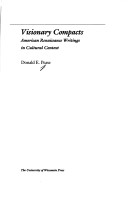The Wisconsin project on American writers
1 total work
In a major contribution to American literary culture, Donald E. Pease reassesses the works of a number of major writers of the American Renaissance, including Hawthorne, Whitman, Emerson, Melville, and Poe. He argues that the Revolutionary mythos, used to explain and organize American Renaissance literature for a century, was not used as an organizing principle by these writers. Pease succeeds in showing that the literature of the 1830s, 1840s, and 1850s addressed specific concerns about the fate of the nation under the political challenges of abolition and secession, the tensions between nationality and locality, and the threat of a civil war they sought to prevent.
During this period, Pease demonstrates, the writers of the American Renaissance did not adhere to the Revolutionary mythos but devised what he calls visionary compacts. Such compacts sanctioned terms of agreement from the nation s past by the founding principles of liberty, equality, and social justice capable of bringing together the nation s citizens. In returning Americans to a vision of agreed upon principles, says Pease, they hoped to restore a common life that all Americans could share, and thereby avoid the need for a civil war.
"
During this period, Pease demonstrates, the writers of the American Renaissance did not adhere to the Revolutionary mythos but devised what he calls visionary compacts. Such compacts sanctioned terms of agreement from the nation s past by the founding principles of liberty, equality, and social justice capable of bringing together the nation s citizens. In returning Americans to a vision of agreed upon principles, says Pease, they hoped to restore a common life that all Americans could share, and thereby avoid the need for a civil war.
"
